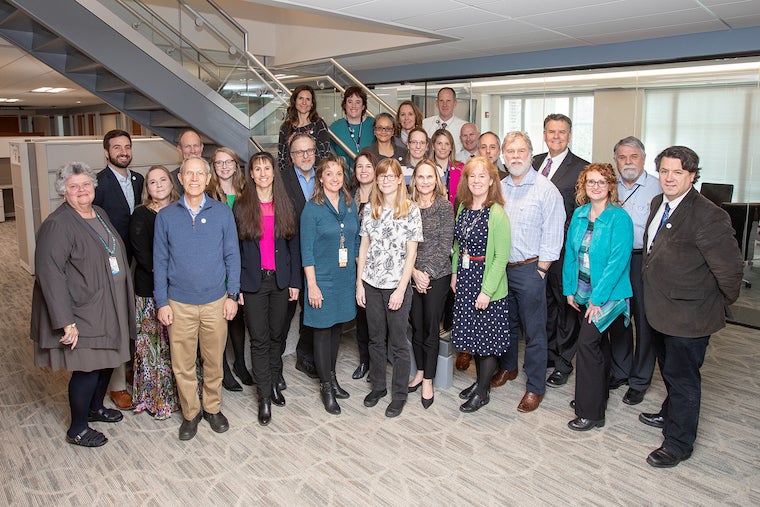
The integrated Translational Health Research Institute of Virginia, or iTHRIV, is using the power of collaboration to accelerate the development of new treatments and cures. (Photo by Coe Sweet)
The integrated Translational Health Research Institute of Virginia, commonly known as “iTHRIV,” has awarded funding to four multi-institutional research projects through the Pilot Translational and Clinical Studies Program. By providing seed grant funding to support early-phase research projects, the program is intended to accelerate joint discovery and the application of translational medical research.
Teams comprised of physicians, researchers and engineers at the University of Virginia, Virginia Tech, Carilion Clinic and Inova Health System were awarded up to $50,000 in funding.
The grants went to:
“A novel biomarker for hereditary angioedema with implications for common vascular disorders”
Led by Clint Miller, an assistant professor at the UVA School of Medicine, and Natalie Hauser, a physician at the Inova Health System, this project will address a potentially life-threatening set of disorders characterized by recurrent swelling called hereditary angioedema. The team has identified a new genetic mutation associated with the disorders and will investigate the effects of this mutation on blood-vessel function, which could lead to improved diagnosis and treatment of the disease as well as other vascular and heart diseases.
“Microbiome-directed prevention of parenteral nutrition-associated liver injury in the NICU”
Parenteral nutrition is a lifesaving intervention in premature infants, but it can also be associated with liver injury. The project team, led by Suchitra Hourigan, a pediatric gastroenterologist at Inova Health, and Sean Moore, an associate professor of pediatrics at the UVA School of Medicine, recently discovered that differences in gut bacteria could put an infant at risk of developing liver injury. The project aims to develop tools that will predict the risk of liver failure from information on an infant’s own microbiome, setting the stage to prevent this complication in high-risk infants.
“Intelligent virtual coach for self-training manual skills in laparoscopy”
The growth of laparoscopic procedures in surgery has led to increased use of simulators to train surgeons on new techniques and procedures. Through a collaboration between engineers at Virginia Tech and UVA, surgeons and residents at Carilion Clinic and researchers at the Fralin Biomedical Research Institute at Virginia Tech Carilion, this project aims to develop an intelligent virtual coach that incorporates eye-tracking technology and machine learning to provide feedback to surgeons and surgeons-in-training that helps them develop and refine their laparoscopic skills. The virtual coach will help surgeons increase their skills with less simulator practice, which has the potential to improve patient outcomes by reducing operating time and promoting implementation of new surgical innovations as they emerge. This project is led by Nathan Lau, an assistant professor of industrial and systems engineering at Virginia Tech; Sarah Parker, research assistant professor at the Fralin Biomedical Research Institute and senior director of the Carilion Clinic Center for Simulation, Research and Patient Safety; Shawn Safford, chief of pediatric surgery at Carilion Clinic; and Laura Barnes, an associate professor of engineering systems and environment at UVA.
“Improved safety and magnetic resonance imaging data accuracy for transcranial focused ultrasound procedures via a novel acoustic coupling bath”
Essential tremor is a debilitating movement disorder that does not readily respond to medication. Transcranial-focused ultrasounds offer immediate and minimally invasive relief, and UVA has been a national leader in developing this novel treatment. This research, led by Craig Meyer, a UVA professor of biomedical engineering, and Eli Vlaisavljevich, an assistant professor of biomedical engineering and mechanics at Virginia Tech, aims to improve the use of magnetic resonance imaging to identify the target region and monitor the effects of treatment during focused ultrasound procedures.
iTHRIV is a cross-state translational research institute funded by the National Center for Advancing Translational Sciences of the National Institutes of Health (UL1 TR003015). iTHRIV combines the expertise of clinical translational biomedical researchers and data scientists to create infrastructure and investigator resources for using data to improve health across Virginia. Partner sites include University of Virginia, Virginia Tech, Carilion Clinic and Inova Health System.
By Eric Swensen, Reposted from UVA Today.
Filed Under: Media Highlights, Research

Comments